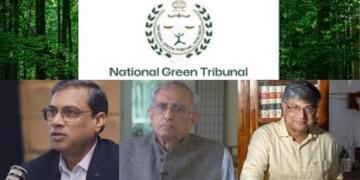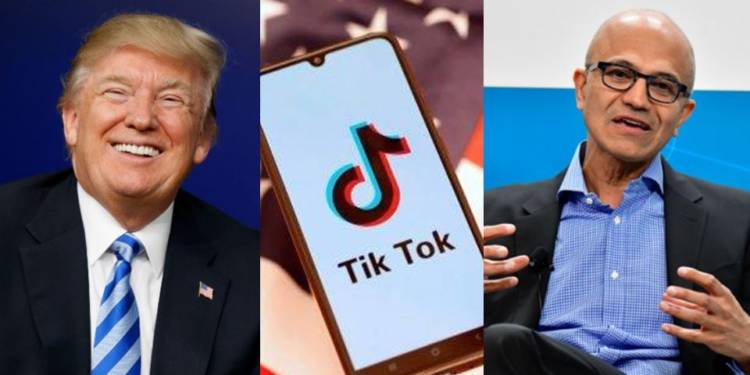India’s banning of TikTok is creating a domino effect. Now, US President Donald Trump too wants to ban the Chinese app that is facing accusations of feeding user data into Chinese servers. India was the largest TikTok user base, while the US accounted for the second-largest revenue base for the Chinese app after China. As such it seems that TikTok is dead after two back-to-back jolts from India and the US. However, TikTok is now in talks with Microsoft for selling off its US operations.
This is a landmark moment in the American tech industry. Microsoft is making the first big step towards finding its way into the data-mining race which is being currently led by internet services giant, Google and social media king, Facebook.
Microsoft, Facebook and Google remain unparalleled tech giants that dominate the virtual world. But as Data giants, Microsoft has been surpassed by Google and Facebook. So how did Google, established in 1998, or a Facebook, established in 2004, left Microsoft behind? It was partly because Microsoft did not see the potential in mining and extracting user data, and its ability to be monetized or predict software application trends.
Established in 1975, Microsoft founded by Bill Gates was leading the world into an internet revolution much before anyone else. Throughout the 1990s, Microsoft which was shaping the world and changing user preference forever.
The race between Windows PC and Apple’s Macintosh remains till date a juicy topic for tech bloggers. Steve Jobs, while worshipped by techies and tech enthusiasts alike maintained tight control over Apple’s products. Apple till date is a tightly controlled company with full control over its hardware and software. Microsoft on the other hand democratized it. Most people in the world learnt their first computer lessons on a Windows PC. In the case of developing economies, it’s almost 100% of their people.
Till today, Microsoft primarily remains a software company, and an impressive one at that. Its global footprint in the tech sector is still unmatchable. Its Windows OS and utility applications like Word, PowerPoint, Excel and Outlook Email Client are still to find a replacement. Microsoft has been active in the servers and the hardware sector too. But what about data? Bill Gates never really understood the importance of data in the way that Google and Facebook did.
Google came on the horizon as a start-up in 1998, and took off in no time. Google heralded the era of cool tech and beat Microsoft at it- Gmail became more popular than Microsoft’s newly acquired HotMail, Google search engine remains much smarter than Bing- Microsoft’s search engine, and there exists a huge quality gap between Microsoft Edge and Google Chrome, the flagship browsers by the two tech giants. Though with the latest update, Microsoft Edge seems to have finally gotten the browser game right.
Google showed the world how data can be monetised big time. Google had no qualms against extracting user data and using it for personalized suggestions, apps and targeted advertising. Psycho-analysis and study of internet user behaviour came along when Google was able to access search engine patterns, GPS data through Google Maps and even more personal data through user behaviour on Youtube. Google isn’t just a software company, it is a suite of everything a citizen of the internet city needs.
Access to such personal data allowed Google to study the location, preferences and demographic profile of an internet user. This is where Microsoft lagged behind Google, because Google knows (or can reasonably infer) what a user wants. In commercial terms, this is designed to influence ads that can target an individual user much more accurately than Microsoft, hence bringing a much bigger Ads business to the tech giant. It can even find out what else does a user want, which can lead to google updating their software quicker than anyone else.
How Google uses big data in the ads business also became clear during former US President Barack Obama’s 2008 election campaign. Of the mammoth 16 million US dollars spent by Obama on online advertising, 7.5 million US dollars went to Google. For Obama’s challenger, it was an asymmetrical election.
But Google is not the only tech giant that has harvested data and realised its true worth. Facebook also swept the data market after its establishment in 2004. Facebook’s strategy is somewhat different though equally effective. Primarily a social media giant, Facebook has a mixture of data- some of it voluntarily submitted and some involuntarily. This is complemented further with text, images and video information, check-in information, private messages, etc. In today’s world, your preferred social media app will know that your wife is pregnant even before you do.
Facebook founder Mark Zuckerberg himself clarified his business model to Senator John Cornyn. He said, “So, if an advertiser comes to us and says, ‘Alright, I’m a ski shop and I want to sell skis to women,’ then we might have some sense because people shared skiing related content or said they were interested in that. They shared whether they’re a woman. And then we can show the ads to the right people without that data ever changing hands and going to the advertiser.”
Google and Facebook sit on piles of personal data and they have usage patterns that enable psycho-analysis and use of Artificial Intelligence (AI). As for Microsoft, it has now understood that it has ceded space to Google and Facebook because it never understood the data game. That it was a Kodak in the world of Cannons and Nikons, a Blackberry in the world of Android and iPhones, a product with a strong core but a rigid core.
Satya Nadella, the present Microsoft CEO, seems primarily tasked to do some catching up. The first big steps were taken in 2018 when the Open Data Initiative (ODI) was announced. Microsoft, Adobe, and SAP forged a partnership to unlock and enrich consumer data. Nadella said, “The most important asset everyone in this room has is data.” He added, “When your data is not locked up, you can think about your sustainability from supply chain to customer experience. That’s where the next step is.”
However, such token partnerships cannot really help Microsoft win the data race with the other two giants- Facebook and Google. What should Microsoft do? Either it can create its own apps and fight it out with Facebook and Google which should sound like an uphill task, or it can buy out an app like TikTok which is already estimated to have 800 million monthly users. It has been downloaded 2 billion times across the world and 175 million times in the USA alone. TikTok is available in 154 countries and 75 languages. In the big fight for easily monetizable access to user data, TikTok might be Microsoft’s grand entry into what seemed like a missed opportunity not so long ago.
TikTok, if we take the Chinese connection out was indeed a revolutionary app. It was all set to replace Facebook as the number one social media app before the sanctions kicked in. It also beat all its contemporaries in the time spent per session parameter. More time spent means more engagement, more engagement means more data. Microsoft taking the reins of TikTok will mean three things. First, the world will not lose a promising app, second, the tech war will get heated up and finally, Microsoft with its impressive distribution network will once again democratize the data segment that Googles and Facebooks of the world have controlled very tightly till date.




























